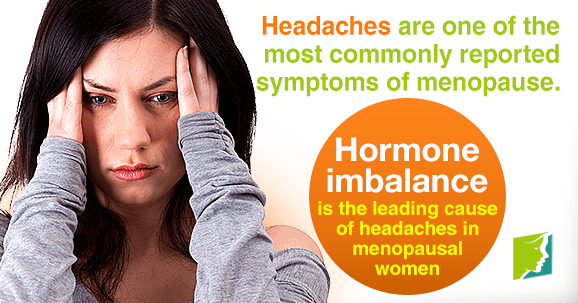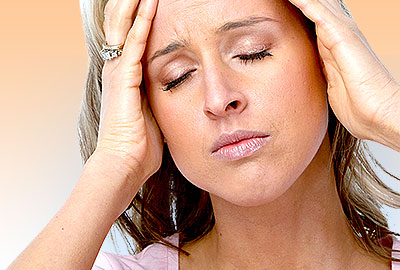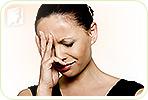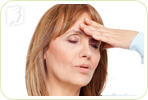Headaches are one of the most common symptoms of menopause. According to the Office on Women's Health, migraine pain affects around 29.5 million Americans. Hormone imbalance is the leading cause of headaches in menopausal women. It has been shown that women experience migraine headaches five times more than men. Women are also more likely to experience an increased frequency and intensity of these headaches as they approach menopause.
Causes
Menopausal headaches are triggered by the fluctuation of estrogen and progesterone. Estrogen makes blood vessels dilate, and progesterone makes them constrict. This irregular expanding and contracting causes pain, which can range from mild to severe.
The two most common types of headaches are tension headaches and migraine headaches. Tension headaches refers to the mild, everyday headaches that typically only last a few hours. Migraines are much more severe, with recurrent, throbbing pain that starts on one side of the head. Migraines can last anywhere from a few hours up to a few days.
There are other contributors to menopausal headaches. These include insufficient sleep, dehydration, lack of exercise, skipped meals, stress, bright lights, strong odors, and excessive alcohol and caffeine consumption.
Treatment Options
There are several effective ways to help treat menopausal headaches. Making simple lifestyle changes - like getting adequate sleep, eating healthy, and exercising regularly - can help prevent and treat menopausal headaches. Swimming, biking, yoga, and walking are also great low-intensity ways to get your daily aerobic activity. Studies have shown that exercising at least two and half hours a week can significantly increase energy levels and reduce stress. Reducing stress is key to preventing headaches and improving overall well-being.
A healthy diet is another key factor in preventing menopausal headaches. Eating balanced meals and healthy snacks every three to four hours is the general recommendation for optimal performance and energy. Eating small healthy meals and snacks will help maintain blood sugar levels, which helps prevent energy crashes and subsequent headaches. Studies have shown that eating smaller, more frequent meals is better than big, heavy meals three times a day. An ideal healthy meal includes all of the food groups, especially protein, fiber, and whole grains.
If none of these methods helps reduce headache pain, it may be helpful to take over the counter medicine like aspirin or ibuprofen. These painkillers help stop the migraine in progress. If over the counter medications are not strong enough, talk to your doctor.
Menopausal headaches are a common complaint among women. They can be prevented by making a few simple lifestyle changes or taking medication. Getting adequate sleep and plenty of exercise are among the natural ways to help prevent menopausal headaches. See a doctor if headache symptoms get worse or do not subside after several days.
Sources
- National Health Service UK. (2013). Hormone headaches. Retrieved August 6, 2014, from http://www.nhs.uk/livewell/headaches/pages/hormonalheadaches.aspx
- Office on Women's Health. (2012). Migraine fact sheet. Retrieved August 6, 2014, from http://www.womenshealth.gov/publications/our-publications/fact-sheet/migraine.html#n




